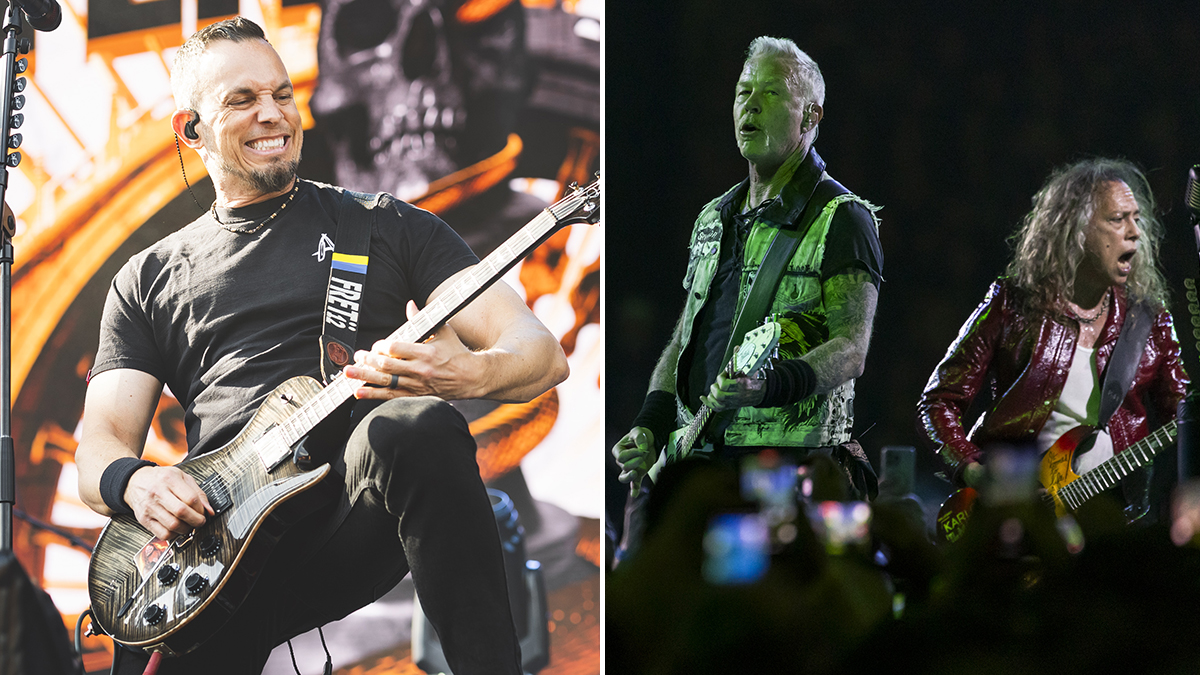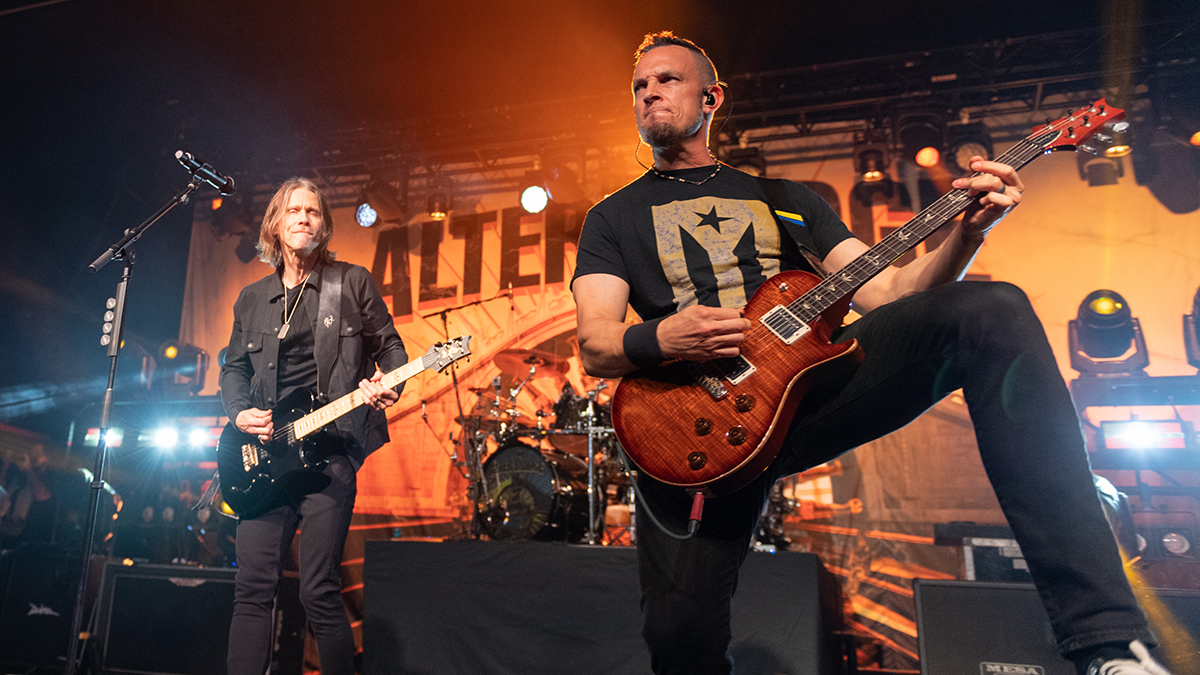
Mark Tremonti has had a hugely successful career as the guitarist in Alter Bridge and the recently reunited Creed. But as he admits: “Honestly, I wouldn't be here right now if it wasn't for Metallica and Master Of Puppets!”
In this exclusive interview, he explains how his life was changed after hearing that classic album, and why down-picking has become one of his greatest strengths.
What do you remember about your first time hearing Metallica?
“One of the most important Metallica tracks for me is Welcome Home (Sanitarium). When I heard my older brother playing that in the bedroom above me, I just couldn’t fall asleep.
“So I went up there asking, ‘What’s this song about a sanitarium?!’ He gave me Master of Puppets and I did not sleep that night. I was just blown away by what I was hearing. Before that, I was listening to the Beastie Boys, Agent Orange... nothing metal. Hearing that album made me go out and carry on searching for the heaviest music I could find.
“What I loved most was the dynamics. That’s something I really credit Metallica for. A lot of heavy bands from that period didn’t use dynamics like they did. Metallica would write these beautiful intros on songs like Battery, Damage, Inc. and The Call Of Ktulu, the latter being the song with which I developed my own fingerstyle technique. Then there was all that beautiful stuff in To Live Is To Die.
“My favourite song of all time could very well be Orion. That variation is a really big thing for me, going from cleaner verses to those kick-you-in-the-nuts choruses, which is what you hear on Welcome Home. Funnily enough, there’s a video online of me covering that song on a Hello Kitty guitar!”
It’s no secret that a big part of that sound comes from James Hetfield’s down-picking...
“James Hetfield’s right hand shaped me as a guitar player. All of us have our strengths and weaknesses, right? It usually comes down to what you grew up playing and practising. With me, I know one of my biggest strengths is all that right hand downpicking rhythm stuff that sounds like ‘Jud jud jud’ because it just keeps going like an engine. That’s where I feel comfortable.
“I don’t need to warm up for that stuff, I can go straight into it because that’s my background. I learned it from bands like Metallica, Slayer, Forbidden and Testament... but Metallica were always the main one. Guitar-wise, Metallica were always more influential on me.”
It’s interesting how a lot of those riffs don’t sound quite right using alternate picking.
“As much as you might not realise it, upstrokes and downstrokes sound a bit different probably because of the angle of the pick. Picking downwards has a bit more of a slice to it, while coming up is usually a bit rounder. That’s why there’s something special about that downward motion – there’s a consistency. I know this might sound weird to beginners, but sitting there for an hour just picking downwards is an artform in itself.
“We tend to dig in and play harder when using just downstrokes. With alternate picking, a lot of us lighten up. I remember Paul Reed Smith picked up one of my guitars once and said, ‘I’ve never seen frets this worn down!’ I just can’t help playing hard and it’s because James plays hard.
“Another difference between him and Kirk is which hand leads and how they hold the pick. Kirk uses more of his left hand virtuosity and holds the pick like most players. James is more right hand-led and holds the pick with his thumb, first and middle fingers. I hold my pick that way, too! I don’t know why, but two fingers and a thumb helps me dig in harder and heavier, plus it feels like there’s more control. Now I have to play like that. I didn’t realise it wasn’t the normal way of holding a plectrum!”
There are similarities but Kirk also draws from his own pool of strengths.
“They’re two very different players, but you have to remember Kirk has to keep up with James when they play those fast riffs live! Kirk is a great alternate picker. He’s also a big reason why I love wah pedals so much, he often does those big one-string wah runs that I love.
“Metallica have two very different guitarists and I think that’s how every band should be. Me and Myles [Kennedy, Alter Bridge guitarist/vocalist] are different – he’s more jazzy and bluesy, and I’m more of a metal guy. We complement each other’s sounds, using different amps to fill different frequency ranges to build a bigger picture. That’s something Metallica have always done.”
What are your favourite Metallica solos, then?
“There’s millions of great Kirk solos. A lot of the ones I’ve mentioned like Sanitarium, Orion and To Live Is To Die have my favourite leads, and One has a beautiful solo. I remember learning that when I was in high school and having so much fun picking it apart. I spent so much time learning all these riffs and solos over the years.
“Metallica are such a big part of my DNA as a player. Both James and Kirk are great blues players – what James does on Nothing Else Matters is all straight pentatonic stuff. That’s what I tend to enjoy the most these days. Maybe when you’re younger you prefer all the flashy stuff, but as you get older you appreciate the bluesy stuff on a deeper level.
“You can’t get away from the pentatonic scale. That’s what speaks to your heart. When you hear rock ’n’ roll vocal melodies, they often come from the pentatonic scale because those are the most emotive notes.”

You’ve used Mesa/Boogie amps a lot over the years. Would it be fair to say that’s partly down to Metallica?
“Yes! I remember getting the Mesa/Boogie 2C+ and they’re probably the most sought-after Mesa amps. They go for a lot of money on Reverb because they’re incredible. I also think the Dual Rectifier Rev F is one of the best amps ever made.
“They’re very different, though. The Rectifier is like the big schoolyard bully that pushes everybody else out, it sounds so big. The 2C+ is more focused and has this great scooped sound that makes you want to play more and more. The Rectifier eats it up by taking more sonic space. And it goes beyond amps. I actually have one of James’s guitars!
“Years ago, one of our security guys was working for them and I mentioned I’d love one of his used instruments. And James was totally cool with it as long as I replaced the one I took with a new one. So he signed this LTD Explorer for me – which was awesome!”
Have you interacted with them much over the years?
“When I first met them, I was really intimidated because they were my heroes. I’ve met them many times now and they’re all very nice. The last show we did together was Download Festival and Lars came into our dressing room to chat for half an hour.
“Later that night, I was watching from the Snakepit. Kirk came along during Fade To Black with his serious face on. Then he spotted me and smiled, saying, ‘Hey Mark!’ It was funny because I was smiling like a schoolkid waving at him and saying, ‘He knows me!’ I’ve probably hung out with Kirk most. Something similar happened a few years ago.
“We were on stage watching them when Fade to Black was starting. The intro was on and Kirk came over, took off his in-ears and said, ‘Hey man, how’s it going?’ I asked what amps he was using and he told me he was running a Kemper plus this and that. Then I said, ‘Dude, your solo is coming up in four seconds!’ and he laughed, saying ‘Oh shit!’ while running off with his in-ears back in!”
- Mark Tremonti’s festive album Christmas Classics New & Old is out now.







